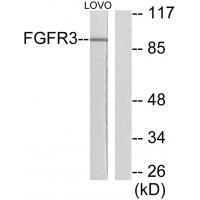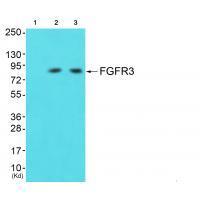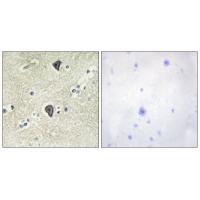


| WB | 咨询技术 | Human,Mouse,Rat |
| IF | 咨询技术 | Human,Mouse,Rat |
| IHC | 1/50-1/100 | Human,Mouse,Rat |
| ICC | 技术咨询 | Human,Mouse,Rat |
| FCM | 咨询技术 | Human,Mouse,Rat |
| Elisa | 咨询技术 | Human,Mouse,Rat |
| Aliases | 2.7.1.112; CEK2; HSFGFR3EX; fibroblast growth factor receptor 3 isoform 1 precursor; fibroblast growth factor receptor 3 isoform 2 precursor |
| Entrez GeneID | 2261; |
| WB Predicted band size | 95kDa |
| Host/Isotype | Rabbit IgG |
| Antibody Type | Primary antibody |
| Storage | Store at 4°C short term. Aliquot and store at -20°C long term. Avoid freeze/thaw cycles. |
| Species Reactivity | Human,Mouse,Rat |
| Immunogen | Synthesized peptide derived from human FGFR3. |
| Formulation | Purified antibody in PBS with 0.05% sodium azide. |
+ +
以下是关于FGFR3抗体的3篇代表性文献的简要总结:
1. **文献名称**: *Targeting FGFR3 signaling in cancer: progress and future directions*
**作者**: Katoh M, et al.
**摘要**: 系统综述了FGFR3在膀胱癌、骨髓瘤等肿瘤中的异常激活机制,重点讨论了单克隆抗体(如MFGR1877S)和小分子抑制剂通过阻断配体结合或受体二聚化抑制下游MAPK通路的抗肿瘤效果及临床试验进展。
2. **文献名称**: *Anti-FGFR3 antibody inhibits multiple myeloma growth via autophagic cell death*
**作者**: Qing J, et al.
**摘要**: 研究发现人源化抗FGFR3抗体(HuG3)可特异性结合t(4;14)易位导致过表达的FGFR3.通过诱导多发性骨髓瘤细胞的自噬性死亡而非凋亡抑制肿瘤生长,小鼠模型显示其与硼替佐米联用可增强疗效。
3. **文献名称**: *Antibody-drug conjugates targeting FGFR3 enhance cytotoxicity in bladder cancer*
**作者**: Duran CL, et al.
**摘要**: 开发了新型FGFR3靶向抗体偶联药物(ADC),采用微管蛋白抑制剂作为载荷。在FGFR3过表达的膀胱癌细胞系中显示出特异性内吞和细胞毒性,动物实验表明其显著抑制肿瘤进展且毒性低于传统化疗。
*注:以上为示例性内容,实际文献需通过PubMed/Web of Science等数据库检索获取。建议使用关键词"FGFR3 antibody" "cancer"筛选近5年高被引论文。*
Fibroblast Growth Factor Receptor 3 (FGFR3) is a transmembrane tyrosine kinase receptor that regulates cell proliferation, differentiation, and survival. It plays critical roles in skeletal development and tissue homeostasis. Dysregulation of FGFR3. through mutations, amplifications, or overexpression, is implicated in various diseases, including skeletal dysplasia (e.g., achondroplasia) and cancers (e.g., bladder cancer, multiple myeloma, and glioblastoma). Oncogenic FGFR3 signaling often drives uncontrolled cell growth, angiogenesis, and resistance to apoptosis, making it a compelling therapeutic target.
FGFR3-targeting antibodies are engineered to block aberrant receptor activity. These antibodies typically function by binding to FGFR3’s extracellular domain, preventing ligand-dependent or ligand-independent activation, downregulating downstream pathways (e.g., MAPK, PI3K/AKT), and promoting receptor internalization. Some antibodies are conjugated to cytotoxic agents (antibody-drug conjugates) or designed to recruit immune cells (bispecific antibodies). Preclinical studies demonstrate their efficacy in inhibiting tumor growth and metastasis in FGFR3-driven models. Clinical trials are ongoing to evaluate safety and efficacy, particularly in cancers with FGFR3 alterations. Challenges include minimizing off-target effects (e.g., FGFR1-4 homology) and addressing resistance mechanisms. FGFR3 antibodies represent a promising precision oncology approach, with potential applications in both genetic disorders and malignancies.
×